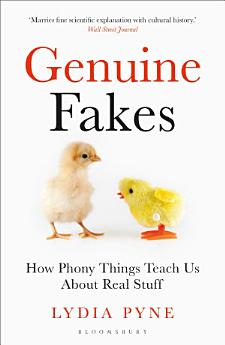Genuine Fakes: How Phony Things Teach Us About Real Stuff
Aug 2019 · Bloomsbury Publishing
Ebook
288
Pages
reportRatings and reviews aren’t verified Learn More
About this ebook
Does an authentic Andy Warhol painting need to be painted by Andy Warhol? Why do audiences feel outraged when they find out that scenes from their beloved blockbuster documentaries are staged? Can people move past assuming that a diamond grown in a lab is a fake? What happens when a forged painting or manuscript becomes more valuable than its original?
This is a book about genuine fakes – the curious and complex objects that provoke these very sorts of questions. Genuine fakes fall into the space between things that are real and things that are not; whether or not we think that those things are authentic is a matter of perspective. Unsurprisingly, the world is full of genuine fakes – full of things that defy simple categorisation.
From stories of audacious forgeries to feats of technological innovation, historian Lydia Pyne explores how the authenticity of eight genuine fakes depends on their unique combinations of history, science and culture. The stories of art forgeries, fake fossils, nature documentaries, synthetic flavours, museum exhibits, Maya codices and Palaeolithic replicas show that genuine fakes are both complicated and change over time.
Drawing from historical archives, interviews, museum exhibits and science fiction as well as her own research, Pyne brings each genuine fake to life through unexpected and often outrageous stories. Genuine Fakes will make readers think about all the unreal things they encounter in their daily lives, and why they invoke the reactions – surprise, wonder, understanding or annoyance – that they do.
This is a book about genuine fakes – the curious and complex objects that provoke these very sorts of questions. Genuine fakes fall into the space between things that are real and things that are not; whether or not we think that those things are authentic is a matter of perspective. Unsurprisingly, the world is full of genuine fakes – full of things that defy simple categorisation.
From stories of audacious forgeries to feats of technological innovation, historian Lydia Pyne explores how the authenticity of eight genuine fakes depends on their unique combinations of history, science and culture. The stories of art forgeries, fake fossils, nature documentaries, synthetic flavours, museum exhibits, Maya codices and Palaeolithic replicas show that genuine fakes are both complicated and change over time.
Drawing from historical archives, interviews, museum exhibits and science fiction as well as her own research, Pyne brings each genuine fake to life through unexpected and often outrageous stories. Genuine Fakes will make readers think about all the unreal things they encounter in their daily lives, and why they invoke the reactions – surprise, wonder, understanding or annoyance – that they do.
About the author
Lydia Pyne is a writer and historian, interested in the history of science and material culture. She has degrees in history and anthropology and a PhD in history and philosophy of science from Arizona State University, and is currently a visiting researcher at the Institute for Historical Studies at the University of Texas at Austin. Her field and archival work has ranged from South Africa, Ethiopia, Uzbekistan and Iran to the American Southwest.
Lydia's writing has appeared in The Atlantic, History Today, Time, The Scientist, Lady Science and Electric Literature as well as The Public Domain Review, and her previous book was Seven Skeletons, the story of human origins.
Lydia's writing has appeared in The Atlantic, History Today, Time, The Scientist, Lady Science and Electric Literature as well as The Public Domain Review, and her previous book was Seven Skeletons, the story of human origins.
Rate this ebook
Tell us what you think.
Reading information
Smartphones and tablets
Install the Google Play Books app for Android and iPad/iPhone. It syncs automatically with your account and allows you to read online or offline wherever you are.
Laptops and computers
You can listen to audiobooks purchased on Google Play using your computer's web browser.
eReaders and other devices
To read on e-ink devices like Kobo eReaders, you'll need to download a file and transfer it to your device. Follow the detailed Help Center instructions to transfer the files to supported eReaders.






